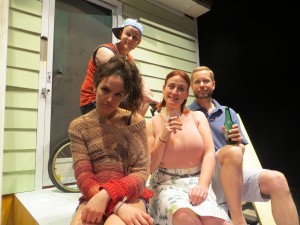The Canadian Premiere of Detroit Underlines the Deficiencies of an Over-Praised Play

The pickings must have been pretty slim the year that Lisa D’Amour’s Detroit emerged as a finalist for the Pulitzer Prize.
To be sure, it offers an ample supply of cheap and easy laughs — a potential enthusiastically exploited in the play’s Canadian premiere by Ottawa’s Plosive Productions. Director Chris Ralph’s overwrought treatment therefore does little to lessen the suspicion that this is a grotesquely overpraised work.
There is certainly validity in D’Amour’s dramatic concerns. The decay of inner-city suburbia is a reality in today’s North America. The spectacle of human lives in economic and social dislocation is another. And although it’s scarcely original in today’s cultural climate to write about the death of the American Dream, there are still interesting variations to be wrung from this theme. But you don’t really get them here.
A more nuanced treatment of a problematic play might have at least yielded the appearance of real substance. But Chris Ralph’s attempt to keep things moving along strikes a shrill and raucous note so much of the time that Detroit keeps disintegrating into little more than into a fashionably dark but nonetheless hollow sit-com.
Two adjoining backyards are the setting for the play’s contrasting examination of a pair of neighbouring couples — so it’s a pity that Attila Clemman’s set design sets a false note as soon as the performance begins. On the right, you have a well-maintained patio, complete with table and umbrella, flanked by a home that exudes middle-class affluence. On the left you see a distinctly grubby property, with a junk-riddled back yard and a crummy frame home that smacks of the trailer park. It’s highly questionable that any suburban developer would countenance such architectural disparities — but in the world of this production they’re laid on with a shovel.
Mary (Teri Loretto Valentik) and Ben (David Whiteley) are the affluent couple — except that they aren’t. He’s lost his job at the bank and spends his time tinkering away at his computer as he attempts to convince himself (and others) that a new career as a financial consultant is taking shape. She is equally self-deceiving — and a drunk. But both are determined to main a false facade to the outside world — particularly when it comes to inviting their new neighbours to an outdoor barbecue. And of course there’s the symbolism of a patio door that keeps jamming and a patio umbrella that collapses.
Kenny (David Benedict Brown) and Sharon (Stephanie Izsak) are the new arrivals — young adults who still haven’t managed to grow up. They’re both fresh from drug rehab, they’re broke, and although the empty house they inhabit belongs to a relative, they’re essentially squatters ensnared in a hostile social and economic culture they can’t really comprehend.
There is enough in D’Amour’s play to suggest that, for all their trailer-trash propensities, these fallible but likeable youngsters are better equipped to survive than their more cultivated next-door neighbours. So the principle of survival of the fittest does take an ironic turn here. More the pity, then, that the dramatic possibilities inherent in this situation are not better explored.
Relationships do evolve in this play even though — significantly — they find no real anchors. In an attempt to commune with nature, the two women jauntily set off on a camping trip that fails to happen. The guys, bolstered by booze, launch a pathetic attempt at male bonding. D’Amour’s capacity for caustically funny dialogue cannot be disputed — but if she also intends us to feel the inner anguish of her characters, as surely she must, we have to take that on trust. There’s not sufficient sub-text to deliver.
The production doesn’t help matters. The opening, which plunges us into a barbecue supper, is delivered on such a frenetic note that there’s really no place for the play to go thereafter. And such stridency, despite occasional moments of relative calm, dominates to the end. This diminishes the impact of the second-act sequence which sees this dysfunctional quartet of human beings exploding into a display of bacchanalian revelry whose very frenzy is supposed to lay bare their inner desperation. Director Chris Ralph has choreographed these moments brilliantly but their impact is blunted by so much that has come before.
As the alcoholic Mary, Teri Loretto-Valentik would be able to offer a more convincing dramatic arc if she was less frantic at the beginning. Meanwhile, as Ben, David Whiteley makes a deeper impact by offering the most restrained performance of the evening — a characterization that, for all its surface amiability, is right for this role in exposing a wounded soul.
David Benedict Brown seems too old for the part of Kenny, but there is a shambling charm to his portrayal. However, the one really shining performance of the evening comes from Stephanie Izsak, who’s splendid in burrowing beneath Sharon’s sometimes mindless facade to reveal a complex human being — one who is both innocent and worldly, also painfully vulnerable, yet ultimately capable of tenacity and resilience.
One could argue that the play is not well-served by the production — which is true. But neither are the production and its hard-working cast well-served by a play incapable of fulfilling its own vision. It is significant that the main body of D’Amour’s text is so unsuccessful in meeting its purpose that she has to attach a clumsy coda at the end in which a philosophical latecomer (nicely played by the reliable Geoff Gruson) tells us what it’s supposed to be all about. But by this point we don’t much care.
Detroit by Lisa D’Amour
Presented by Plosive Productions
Gladstone Theatre, Ottawa
January 17-February 1.
www.thegladstone.ca or 613 233 GLAD
Director: Chris Ralph
Set: Attila Clemmon
Lighting: David Magladry
Sound: Melinda Roy
Costumes: Kara-Lynne Weaver
Cast
Mary: Teri Loretto-Valentik
Sharon: Stephanie Izsak
Kenny: David Benedict Brown
Ben: David Whiteley
Frank: Geoff Gruson